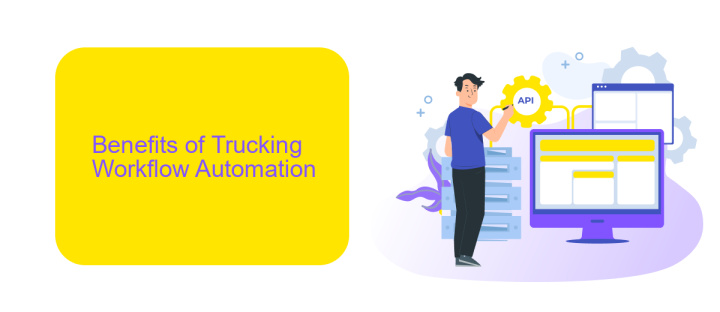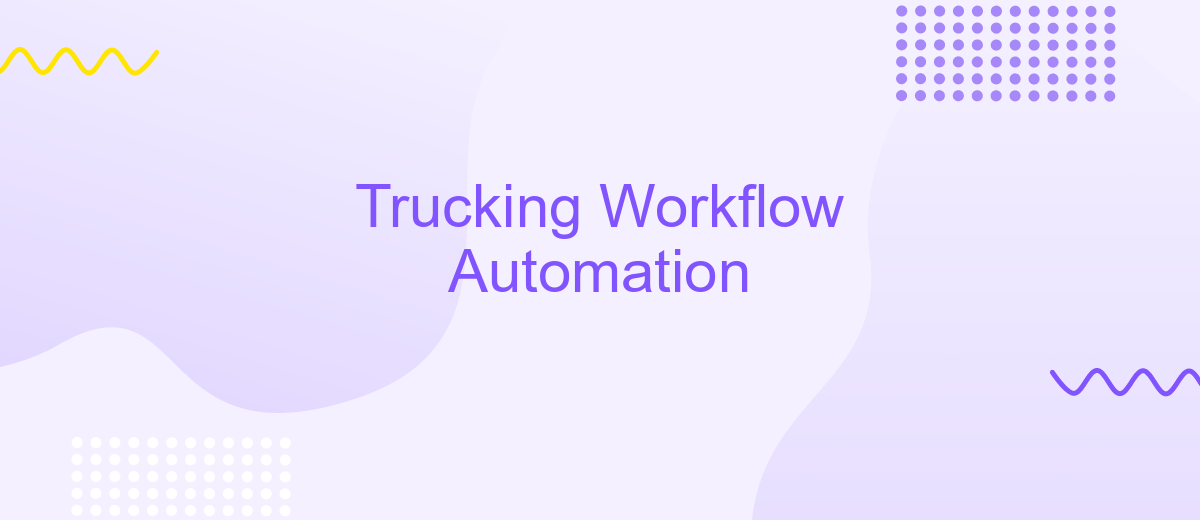Trucking Workflow Automation
In the fast-paced world of logistics, trucking companies are constantly seeking ways to enhance efficiency and reduce operational costs. Trucking workflow automation emerges as a game-changer, streamlining processes from dispatch to delivery. By leveraging advanced technologies, companies can optimize routes, manage fleets in real-time, and improve overall productivity, ensuring timely deliveries and increased customer satisfaction.
Introduction
In the rapidly evolving logistics industry, the need for efficient and streamlined operations has never been more critical. Trucking companies are increasingly turning to workflow automation to enhance their operational efficiency, reduce costs, and improve service delivery. By automating various aspects of the trucking workflow, companies can focus more on strategic planning and less on manual tasks.
- Reduced human error through automated data entry and processing
- Improved route planning and scheduling with real-time data
- Enhanced communication between drivers and dispatchers
- Streamlined compliance and reporting processes
One of the key components of effective trucking workflow automation is the integration of various systems and services. Tools like ApiX-Drive facilitate seamless integration between different software platforms, ensuring that data flows smoothly and accurately across the entire operation. By leveraging such services, trucking companies can achieve a higher level of automation and efficiency, ultimately leading to better business outcomes.
Benefits of Trucking Workflow Automation

Trucking workflow automation significantly enhances operational efficiency by reducing manual tasks and streamlining processes. This leads to faster delivery times, fewer errors, and increased productivity. Automated systems can manage scheduling, route optimization, and real-time tracking, ensuring that every aspect of the trucking operation is running smoothly. As a result, companies can save time and resources, ultimately improving their bottom line.
Another critical benefit is the seamless integration of various systems and services. Tools like ApiX-Drive facilitate the connection between different software platforms, allowing for a more cohesive and efficient workflow. By automating data transfer and communication between systems, businesses can minimize disruptions and ensure that all departments are working with up-to-date information. This level of integration not only enhances operational efficiency but also provides valuable insights that can drive strategic decision-making and continuous improvement.
Key Components of Trucking Workflow Automation

Trucking workflow automation is essential for enhancing efficiency, reducing errors, and improving overall productivity in the logistics industry. Key components of this automation process include:
- Route Optimization: Automated systems analyze traffic patterns and delivery schedules to determine the most efficient routes, saving time and fuel.
- Load Planning: Advanced algorithms ensure optimal load distribution, maximizing vehicle capacity and minimizing transportation costs.
- Real-Time Tracking: GPS and telematics provide real-time updates on vehicle location and status, enhancing transparency and customer satisfaction.
- Electronic Logging: Automated logging systems track driver hours and compliance with regulations, reducing paperwork and human error.
- Integration Services: Tools like ApiX-Drive facilitate seamless integration between various software systems, ensuring smooth data flow and operational coherence.
By incorporating these key components, trucking companies can streamline their operations, reduce operational costs, and provide better service to their clients. Automation not only improves efficiency but also enables companies to adapt quickly to changing market demands and regulatory requirements.
Challenges and Best Practices

Implementing trucking workflow automation comes with its own set of challenges. One of the primary issues is the integration of various software systems and platforms, which can be complex and time-consuming. Additionally, ensuring data accuracy and real-time updates across all systems is crucial for maintaining operational efficiency.
To overcome these challenges, companies should adopt best practices such as thorough planning and phased implementation. Utilizing services like ApiX-Drive can streamline the integration process by connecting disparate systems and automating data flow.
- Conduct a comprehensive needs assessment before selecting automation tools.
- Choose scalable solutions that can grow with your business.
- Ensure robust training programs for staff to maximize tool usage.
- Regularly monitor and update systems to maintain optimal performance.
By following these best practices and leveraging tools like ApiX-Drive for seamless integrations, trucking companies can enhance their workflow efficiency, reduce operational costs, and improve overall service quality.
- Automate the work of an online store or landing
- Empower through integration
- Don't spend money on programmers and integrators
- Save time by automating routine tasks
Conclusion
In conclusion, the automation of trucking workflows presents a significant opportunity for the logistics industry to enhance efficiency, reduce operational costs, and improve overall service quality. By leveraging advanced technologies and integrating various systems, companies can streamline their operations and minimize human error, leading to more reliable and timely deliveries. The implementation of automated solutions not only boosts productivity but also provides valuable data insights that can drive informed decision-making and strategic planning.
Moreover, the use of integration services such as ApiX-Drive facilitates seamless connectivity between different platforms and applications, ensuring that all systems work in harmony. This integration capability is crucial for maintaining a smooth and cohesive workflow, enabling real-time data sharing and synchronization. As the trucking industry continues to evolve, embracing automation and effective integration solutions will be essential for staying competitive and meeting the growing demands of the market.
FAQ
What is Trucking Workflow Automation?
How can Trucking Workflow Automation benefit my business?
What are some common features of Trucking Workflow Automation tools?
How do I integrate Trucking Workflow Automation with my existing systems?
Is Trucking Workflow Automation scalable for small and large fleets?
Apix-Drive is a simple and efficient system connector that will help you automate routine tasks and optimize business processes. You can save time and money, direct these resources to more important purposes. Test ApiX-Drive and make sure that this tool will relieve your employees and after 5 minutes of settings your business will start working faster.


